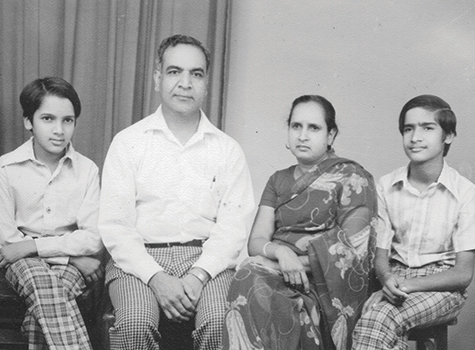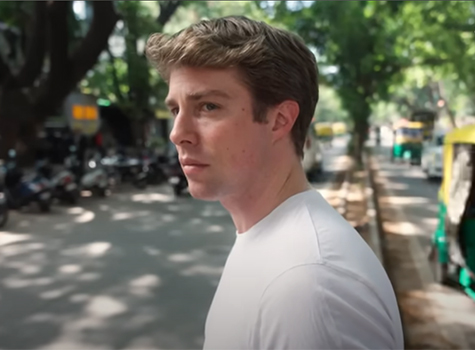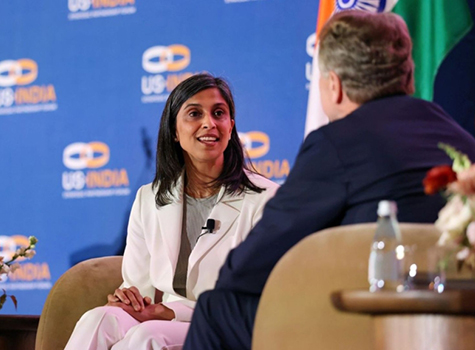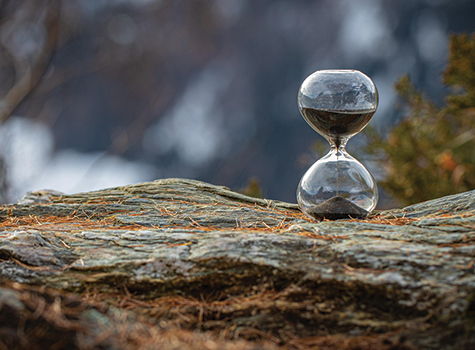By Raajeev Aggerwhil

In the 1970’s, my father was traveling to the US often. He was practically living in San Francisco, 11 months out of a year, making his yearly pilgrimage to India. He decided to outsource the care of me and my brother to our mom in India. My mom was an economics high school teacher. Because of her busy schedule, she outsourced our care to our live-in helper, Bankay. My mom’s brother and his family were living in the house, so it was an extended joint family.
My uncle acted like a de facto father figure for my brother and me. We would look up to him 11 months out of a year, when our father was not around. He was a chain smoker, consuming two packs of Panama cigarettes every day. He could be annoying at times, because rather than covering his smoke-induced cough, he would unknowingly cough on top of our heads. He would also often come home drunk every few months, his incoherent speech and movements, still vivid in my mind. My father on the other hand, despite his stay in the US, was a teetotaler.
Despite his shortcomings, my uncle was our role model. He was helping my father in the import-export business, taking care of the export part from India. He knew how to deal with the suppliers of brass carriage lamps, paper mache pill boxes, and paper kites. He would negotiate with the rickshaw-wallas by insulting them if they asked for more money than the standard fare, “Dimag Kharab hai Kya? Are you out of your mind?” In his previous job, he acted as a general contractor, so he knew how to deal with the construction workers and get the job done. We looked up to him for his leadership qualities.
With his and my aunt’s presence, and their two children, we had a house full of activities. Our two cousins were a few years younger than us, but my brother and I would play with them. Festivals like Diwali, Holi, Dusshera, and Raksha Bandhan were celebrated with our dozens of other cousins, friends, uncles, and aunts who lived near our house in Old Delhi. According to the Hindu lunar calendar, Diwali usually is in October. Our Diwali did not follow the Hindu lunar calendar because it depended on whenever our father would come from the US. He would mostly come in August or September and prior to his arrival we would get the house cleaned and freshly painted.
On his annual trip to India, my father would bring two big suitcases filled with his business samples, such as incense sticks, brass beads, and Korean-made plastic dragon kites with long tails. In addition he would bring his personal clothes and gifts for all of us, including extended family members. I remember one suitcase would sit on the living room floor, which resembled a giant chess board with alternating black and white squares. The other suitcase would be in the adjacent room with a similar chess board pattern, except the tiles were red and white. We never questioned the aesthetics of those designs. We never knew if those new floors were added after my father had bought the house or they came as is. We just felt lucky to have a roof over our heads.
After a couple of hours of listening to our dad’s in-person podcast of his stay in the US, progress in business and politics in India, we would start the ritual of opening the suitcases. My father would proudly take the individual items out and pile them in three different categories: business items, his personal clothes, and gifts. The gift pile would be the biggest because there were so many stakeholders.
The gifts rotated every year. One year, there was a red Chevrolet convertible car with a wired remote that my brother and I spent hours navigating on the checkered floors of our rooms. Another year was a steam engine which would emit actual smoke and change directions after bumping into a wall. Then there was Ford car that had a special mechanism preventing it from falling from a table.
One year there was a wine glass that gave the impression that it was half full, but the red wine was inside the two glass coats of the gobbler. We would marvel at the fact that the wine would not spill out and scare relatives by pretending to throw a cup of wine at them. On that same visit, after a couple of days, my brother and I filled up the wine cup with water. When we brought it to the living room, my uncle grabbed it and threw at one of our other relatives, drenching their face and clothes with water!
Another year, my father brought a couple of plastic birds which would fly from one corner of the room to another after you would wind them. Then there was view master with a deck of colored slides with pictures ranging from sites of the San Francisco Golden Gate Bridge, cable cars, redwood trees. Another deck of slides had views of NASA Apollo Mission.
Besides toys, he would bring brightly colored polyester shirts, bell bottom pants and winter jackets. There were saris made of American Georgette, generic brand lipsticks and large bottles of Intimate perfume by Revlon. My mom would take the perfume out and put them in small generic glass bottles and give them out to relatives.
During my younger years, I used to feel very fortunate that our father lived in the US, and he cared for our family bringing all these wonderful toys and gifts. We considered our childhood as normal as any of our friends from a lower middle-class upbringing. We were too young to even realize that we were deprived in any way. I think the yearly visits of our father with all the toys helped. As I reflect and visualize the image of a large brown polyester suitcase sitting in our living room, I cannot stop comparing it with a Trojan horse where soldiers disguised as toy cars, flying birds and Levi’s jeans would crawl out into our house and blow out any isolation or despair before they actually became sizable.
I can still see the whiskey-colored Revlon Intimate bottle and smell its blended aroma of Rose, Gardenia, Bergamot, and Sandalwood. It took me many years after coming of age to realize that the blended smell of Intimate perfume must have acted like opium to help bring some semblance of normalcy to my mother’s life. I can now understand her pain, frustration, and loneliness being a single mom 11 months out of a year and only be able to share those feelings with her husband through handwritten words expressed on thin light parchment papers from Nai Sarak, the Old Delhi book market. Those thin pink or green translucent sheets of paper were for the sole purpose of saving money on overseas air mail postage. There were no WhatsApp, no text messages and rarely any phone calls. The first time we got a phone call was a 3-minute call which my father booked after being away for a couple of years on his trip. I can still remember the relief and joy on my mother’s face from that phone conversation.
Sure, she had her brother supporting her in the business and her sister-in-law, living in the house provided some companionship but I can imagine the isolation and void she must have felt day after day coming from her job in the evening. I still vaguely remember the snide, snarky remarks of intrusive relatives asking my mom where her husband was and when he would be back. I am sure she must have figured out an optimal way to triangulate her happiness from the curves of supply and demand from her students’ economics homework. My brother and I were too young and too naïve to understand any of those feelings.
My father was a great man. He lived a very hard but honest life with immaculate character and integrity. Besides his tremendous willpower, I inherited his sense of humor, irritable behavior, and dry skin. I appreciate all his hard work and how he worked tirelessly to create a brighter future for all of us, but I do not agree with some of his choices by not keeping the family together for over a decade. He believed that he would always go back to India and feared that by having his children grow up in the US, they would get spoiled. His fears are not alone. When my children were teenagers, I too had the same fears that my American born children would get into drugs, gangs or would pay full price for anything!
My childhood was a bit paradoxical. I adored my father, a strong-willed Arya Samaj follower and his abstinence from cigarettes and alcohol. I also looked up to my uncle, his leadership style and support of his sister. Despite his vices, it is interesting that my uncle outlived all his five other siblings. Maybe because he would only drink so much once every few months or maybe it was because he stopped smoking when he got into his 60’s. I can now imagine my mom’s pain seeing her brother come near the house drunk and watching her teenage children escorting him back to the house.
Despite my ups and downs in my professional career, and despite having lived in San Francisco, Virginia, Boston, and several cities within the Los Angeles area, one thing I made sure I would never do. I made sure wherever I lived, I would keep the family together. I made sure I would attend as many PTA meetings, soccer games, and piano recitals as possible. I made sure that we celebrated all the major American and Indian festivals together, including Thanksgiving, Christmas and especially Diwali. I made sure that my children could never feel that void of not having their father around for an extended period and they would not have a Trojan horse childhood. I also made sure my wife never would have to hide her pain because of my extended absences relying on the opium of Revlon perfume bottles. Instead, she can just express her occasional outbursts of anger and frustration through her comedy, making me the target of her jokes. For that, I am thankful!
Raajeev Aggerwhil is a Los Angeles-based comedian. Follow him on Instagram @raajeevcomedy or search for him on YouTube.



